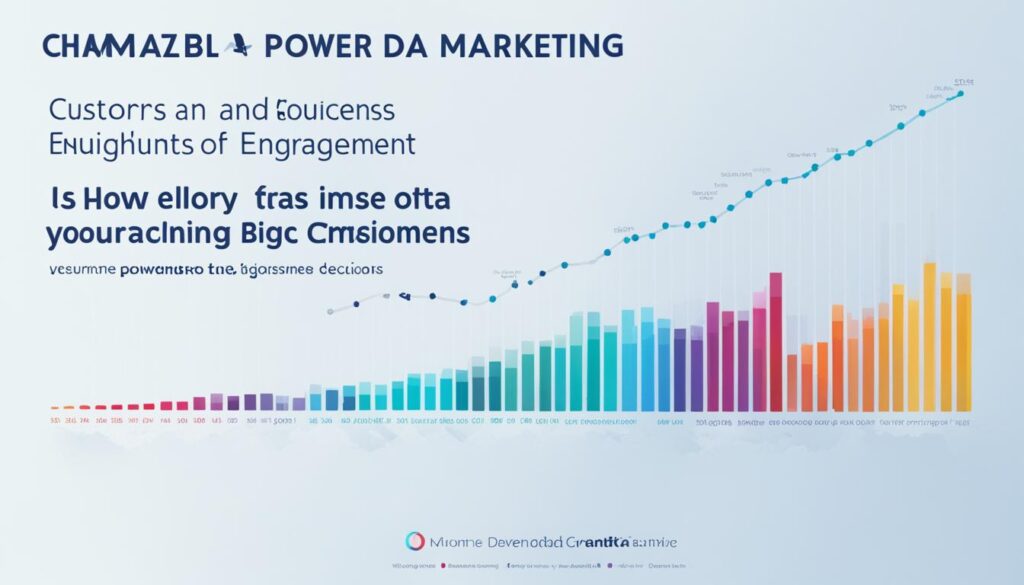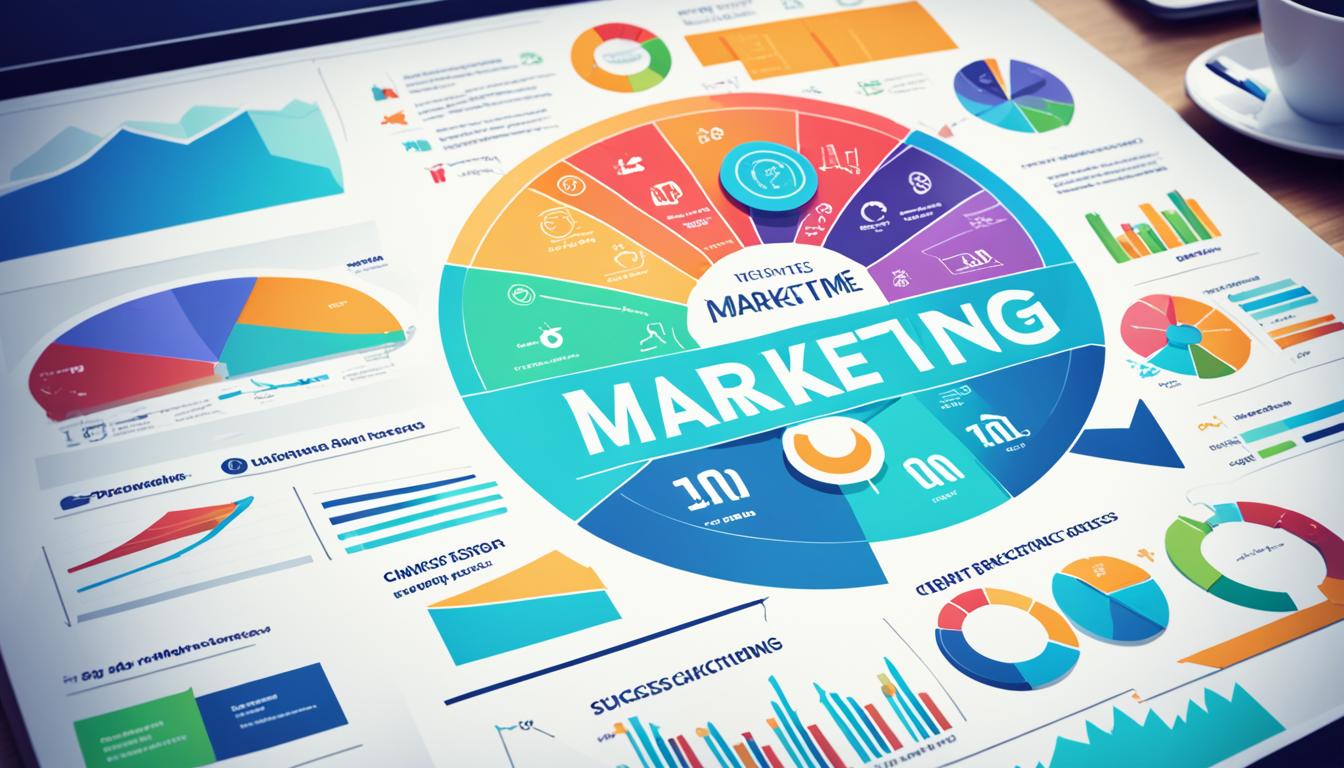Big data has revolutionized the way marketers understand and interact with their audience. By utilizing vast amounts of structured and unstructured data, businesses can make data-driven decisions, improve customer experiences, reduce costs, and drive innovation. The benefits of using big data in marketing include enhanced decision-making, improved customer satisfaction, and measurable business value. Data collection, advanced analytics, real-time processing, and personalization are key drivers behind the big data revolution.
Key Takeaways:
- Using big data in marketing can lead to better decision-making and improved customer satisfaction.
- Data collection, advanced analytics, and real-time processing are essential for leveraging big data in marketing.
- Personalization through big data enables businesses to deliver targeted marketing campaigns and improve customer engagement.
- Predictive analytics based on big data can provide valuable insights and help drive marketing strategies.
- Real-time data analysis allows marketers to respond quickly to customer behavior and deliver personalized content.
Understanding Big Data in Marketing
Big data has become an integral part of modern marketing strategies, revolutionizing the way businesses understand and engage with their customers. In the digital age, vast amounts of data are generated through various digital touchpoints such as social media, websites, and mobile apps. This wealth of data presents immense opportunities for marketers to gain valuable insights and leverage them to drive growth and success.
The benefits of using big data in marketing are undeniable. By harnessing the power of big data analytics, marketers can make informed decisions, personalize marketing strategies, and provide tailored experiences to their target audience. Let’s explore some of the key advantages of integrating big data into your marketing efforts:
- Improved Performance: Big data enables marketers to measure the effectiveness of their campaigns in real-time, allowing for quick adjustments and optimizations. By analyzing data from various sources, marketers can identify trends, understand customer preferences, and fine-tune their strategies for improved performance.
- Increased ROI: Data-driven marketing strategies have been proven to deliver higher returns on investment. By utilizing big data analytics, businesses can identify the most valuable customer segments, optimize marketing spends, and maximize the impact of their campaigns. This data-driven approach ensures that marketing efforts are targeted, relevant, and have a higher probability of success.
- Competitive Advantage: In today’s competitive landscape, staying ahead of the curve is crucial. Big data empowers marketers with insights that can give them a competitive edge. By understanding customer behavior, preferences, and needs, businesses can create personalized experiences and build stronger relationships with their audience, setting themselves apart from the competition.
A data-driven marketing strategy lies at the core of leveraging big data effectively. This approach involves leveraging customer data to create personalized, targeted campaigns that drive growth and engagement. By analyzing customer behavior, demographics, and interactions, marketers can segment their audience and deliver tailored content at the right time, through the right channels. This level of personalization enhances customer experiences, fosters brand loyalty, and drives revenue.

Collecting and Analyzing Big Data for Marketing
When it comes to leveraging big data for marketing, collecting and analyzing data are essential steps in gaining valuable insights. There are several methods and tools available to marketers for effective data collection and analysis.
Data Collection for Marketing
To collect relevant data for marketing purposes, web analytics tools are invaluable. Google Analytics, for example, enables businesses to track visitor behavior on their websites. This tool provides insights into customer needs, preferences, and interactions, allowing marketers to make data-driven decisions and tailor their marketing strategies accordingly.
In addition to web analytics, social media monitoring tools play a crucial role in data collection. Platforms like Facebook, Twitter, and LinkedIn offer valuable customer insights. By gathering data from social media, marketers can understand customer behavior, preferences, and trends, enabling them to develop targeted marketing campaigns.
Furthermore, surveys, polls, and online feedback forms provide another avenue for collecting valuable customer information. By engaging customers directly, businesses can gain insights into their interests, preferences, and satisfaction levels. These data collection methods help marketers better understand their target audience and optimize their marketing efforts.
Big Data Analytics Tools
Data analysis is a vital aspect of big data utilization in marketing. To effectively analyze big data, marketers can leverage a range of tools and technologies. These tools provide advanced analytics capabilities, allowing businesses to make informed decisions and uncover valuable insights.
One popular example of a big data analytics tool is Tableau. This tool enables marketers to visualize and explore data through interactive dashboards, facilitating data analysis and interpretation. Other tools like IBM Watson Analytics and Microsoft Power BI provide similar functionalities, empowering marketers to derive actionable insights from large datasets.
Data Analysis for Marketing
Data analysis plays a crucial role in identifying market trends, targeting customers effectively, and improving overall marketing strategies. By analyzing big data, marketers can discover patterns, correlations, and insights that help optimize marketing campaigns and improve customer engagement.
Through data analysis, marketers can identify customer preferences, personalize marketing efforts, and enhance customer experiences. This level of data-driven precision enables businesses to connect with customers in more meaningful ways and deliver the right message, at the right time, through the right channels.
By combining data collection methods with advanced analytics tools, marketers can harness the power of big data to inform their marketing strategies and drive business success.
Leveraging Big Data for Real-Time Marketing Campaigns
Real-time marketing is a powerful strategy that allows businesses to connect with their customers at the right moment, capturing their attention and driving engagement. To achieve success in real-time marketing, leveraging big data and incorporating real-time data analysis is essential. By analyzing data in real-time, marketers can gain valuable insights into customer behavior and preferences, enabling them to deliver personalized content, offers, and messages that resonate with their audience.
Real-time data analysis plays a crucial role in enabling businesses to respond quickly to customer behavior and adapt their marketing campaigns accordingly. With the help of advanced analytics tools, marketers can track and monitor real-time data, allowing them to identify trends, anticipate customer needs, and make data-driven decisions that drive business growth.
One of the key advantages of leveraging big data for real-time marketing campaigns is the ability to deliver personalized experiences to customers. By analyzing real-time data, marketers can tailor their marketing campaigns to individual preferences and interests, ensuring that the right message reaches the right customer at the right time. This level of personalization significantly improves customer engagement and increases the likelihood of conversions.
Additionally, real-time customer engagement is a crucial aspect of effective real-time marketing campaigns. By analyzing data in real-time, marketers can identify opportunities for customer engagement and take immediate action. Whether it’s responding to social media mentions, addressing customer queries, or providing personalized recommendations, real-time customer engagement creates a seamless and interactive experience for customers, fostering loyalty and driving brand advocacy.
To illustrate the power of leveraging big data for real-time marketing campaigns, consider the following example:
XYZ Company, an e-commerce retailer, uses real-time data analysis to personalize their marketing campaigns. By tracking customer browsing behavior, purchase history, and preferences in real-time, XYZ Company delivers personalized product recommendations to customers when they visit their website. This real-time personalization not only enhances the customer experience but also increases the likelihood of conversions and repeat purchases.
By leveraging big data and incorporating real-time data analysis, businesses can unlock the full potential of real-time marketing. The ability to deliver personalized experiences, respond quickly to customer behavior, and engage customers in real-time creates a competitive advantage in today’s dynamic market.
| Benefits of Leveraging Big Data for Real-Time Marketing Campaigns |
|---|
| 1. Enhanced customer engagement and satisfaction |
| 2. Increased conversion rates and sales |
| 3. Improved targeting and relevancy of marketing campaigns |
| 4. Real-time response to customer behavior and market trends |
| 5. Competitive advantage in the digital landscape |
By harnessing the power of big data and real-time data analysis, businesses can revolutionize their marketing efforts and achieve significant business growth. The ability to deliver personalized marketing campaigns, engage customers in real-time, and adapt quickly to changing market dynamics is crucial in today’s fast-paced digital world.

The Power of Data-Driven Marketing
Data-driven marketing is a game-changer for businesses looking to make informed decisions and drive success. By leveraging customer data and analyzing it comprehensively, marketers can gain valuable insights into consumer behavior, preferences, and needs. This enables them to create highly targeted and effective marketing campaigns that deliver exceptional results.
Data-driven decision-making has proven to be far superior to relying on gut instinct. When marketing strategies are rooted in data, businesses can optimize their efforts, reduce risks, and achieve a higher return on investment (ROI). By systematically collecting and analyzing data, marketers gain a deeper understanding of their customers and can tailor their messages to resonate with them on a personal level.
| Benefits of Data-Driven Marketing | Increased ROI | Improved Customer Engagement |
|---|---|---|
| 1. Enhanced targeting and segmentation | 1. Higher revenue and profitability | 1. Increased customer loyalty |
| 2. Personalized marketing campaigns | 2. Improved marketing efficiency | 2. Enhanced customer experiences |
| 3. Optimized customer acquisition | 3. Enhanced customer acquisition | 3. Greater customer satisfaction |
“Data-driven marketing allows businesses to make targeted, strategic decisions based on factual insights. It’s like having a roadmap that guides you towards marketing success.” – Marketing Expert
Marketers who embrace data-driven strategies are better equipped to navigate the ever-evolving landscape of consumer expectations. They can identify trends, anticipate customer needs, and develop compelling campaigns that resonate with their target audience. This not only drives increased ROI but also helps businesses stay ahead of the competition.
Unlocking the Full Potential
- 1. Embrace advanced analytics tools to uncover hidden patterns and trends in the data.
- 2. Utilize predictive analytics to anticipate customer behavior and tailor marketing efforts accordingly.
- 3. Continuously track and measure campaign performance to optimize outcomes and refine strategies.
The power of data-driven marketing is undeniable. By harnessing the insights provided by data analysis, businesses can better understand their customers and develop highly effective marketing strategies. In a competitive marketplace, the ability to make data-driven decisions sets businesses apart and positions them for long-term success.

Integrating Big Data into Your Marketing Strategy
Integrating big data into your marketing strategy is essential for staying competitive in today’s data-driven world. By utilizing the data you already have and collecting as much new data as possible, you can gain valuable insights into customer behavior and preferences. One powerful tool that can assist you in this process is Customer Relationship Management (CRM) software.
CRM software allows you to effectively analyze customer behavior, track interactions, and manage customer relationships. By centralizing customer data in a CRM system, you can easily segment your audience, personalize your marketing efforts, and improve customer experiences.
Collecting data from various channels such as websites, social media platforms, and email campaigns provides a comprehensive view of your customers’ needs and interests. Analyzing the data collected from these channels can unveil valuable insights that shape your marketing strategy.
“Integrating big data into your marketing strategy is like having a flashlight in a dark room. It illuminates your customers’ needs, preferences, and behaviors, allowing you to make informed, strategic decisions.”
The Benefits of Big Data Integration in Marketing
Integrating big data into your marketing strategy offers several benefits:
- Personalized Marketing: By analyzing customer data, you can create personalized marketing campaigns that resonate with individual customers, increasing engagement and conversions.
- Improved Targeting: With a comprehensive view of customer needs and interests, you can target your marketing efforts more effectively, reaching the right customers with the right message at the right time.
- Optimized Customer Journey: Big data integration allows you to map the customer journey more accurately, identifying pain points and opportunities for improvement. This enables you to deliver a seamless and satisfying customer experience.
- Enhanced Decision-Making: By basing your marketing decisions on data insights, you can minimize guesswork and make informed choices that lead to measurable results and increased ROI.
By integrating big data into your marketing strategy, you can unlock the full potential of your data and drive meaningful business growth.
An Example of Big Data Integration in Marketing
Let’s take a look at an example of how big data integration can enhance your marketing strategy:
| Traditional Approach | Big Data Integration Approach |
|---|---|
| Mass email campaigns sent to all subscribers, resulting in low open rates and conversions. | Segmented email campaigns based on customer behavior, preferences, and past purchases, resulting in higher open rates and conversions. |
| Generic website content for all visitors, leading to a lack of personalization. | Dynamic website content based on real-time customer data, providing personalized experiences and increasing engagement. |
| Expensive advertising targeted broadly to a wide audience. | Targeted advertising based on specific customer segments, maximizing ad spend and driving better results. |
As you can see from this example, integrating big data into your marketing strategy allows you to tailor your marketing efforts to each customer’s unique preferences, resulting in improved customer engagement and greater ROI.

Integrating big data into your marketing strategy is the key to unlocking valuable insights, improving targeting, and delivering personalized experiences to your customers. By leveraging the power of big data through CRM software and analyzing data from multiple channels, you can make data-driven decisions that drive business success.
The Future of Big Data in Marketing
The future of big data in marketing is poised to revolutionize the industry, presenting businesses with exciting opportunities for innovation, efficiency, and customer insight. Advancements in technology and data management capabilities have made it easier and more cost-effective to store, process, and analyze vast amounts of data. This has paved the way for data-driven marketing strategies that can significantly impact business success.
With big data, businesses can gain a deep understanding of customer preferences, allowing them to deliver personalized products, services, and experiences. By leveraging data analytics, marketers can make informed decisions and optimize marketing campaigns to generate maximum revenue. The future of big data in marketing holds numerous possibilities for improving customer engagement, building long-term relationships, and driving growth.
A successful implementation of big data in marketing requires the right team, adequate resources, and a smart approach to data management. Organizations need skilled professionals who can extract valuable insights from complex data sets, interpret them effectively, and apply them strategically to enhance marketing efforts. Investing in advanced analytics tools and technologies can also give businesses a competitive advantage in a data-driven world.
“The future of marketing lies in leveraging big data to make data-driven decisions, personalize experiences, and outperform the competition.” – Jane Carter, Chief Marketing Officer at DataX
Big Data in Marketing Trends
As big data continues to shape the marketing landscape, several trends are emerging that will drive its future impact:
- Increased emphasis on real-time data analysis: Real-time data analysis allows marketers to respond to customer behavior and market trends promptly. It enables personalized marketing campaigns and dynamic targeting, resulting in improved customer engagement and conversion rates.
- Integration of artificial intelligence and machine learning: AI and machine learning algorithms can process vast amounts of data, identifying patterns, trends, and predictive insights. By leveraging these technologies, marketers can automate decision-making processes, enhance personalization, and optimize marketing strategies.
- Privacy and data protection: As data-driven marketing expands, privacy regulations and data protection measures are becoming more stringent. Businesses must adopt ethical data practices and ensure compliance to establish trust with customers and safeguard their personal information.
- Value-driven marketing: Consumers are increasingly prioritizing brands that align with their values. Big data can help marketers understand customer preferences, behavior, and social impact expectations, allowing them to develop purpose-driven marketing strategies and campaigns.
Data-Driven Marketing Innovation
Big data has the potential to drive marketing innovation across various industry sectors. Here are a few examples of how data-driven marketing strategies are shaping the future:
| Innovation | Impact |
|---|---|
| Personalized customer experiences | Increased customer satisfaction, engagement, and loyalty through customized products, services, and marketing messages tailored to individual preferences and needs. |
| Predictive analytics | Use of historical and real-time data to forecast customer behavior, identify market trends, and optimize marketing strategies, resulting in higher conversion rates and improved ROI. |
| AI-powered chatbots | Enhanced customer service and support through AI chatbots that leverage big data to deliver personalized, accurate, and real-time responses to customer queries and concerns. |
| Dynamic pricing | Optimization of pricing strategies based on data analytics, market demand, and customer behavior, allowing businesses to maximize profitability and revenue. |
| Customer journey analytics | Understanding and optimizing the end-to-end customer journey by analyzing data from multiple touchpoints, enabling businesses to enhance customer experiences and drive conversions. |
The future of big data in marketing is bright, with endless possibilities for leveraging data-driven insights to fuel marketing success. Businesses that embrace big data, invest in the right technologies, and prioritize data-driven decision-making will gain a competitive edge in the evolving digital landscape.
Conclusion
In conclusion, big data has become a game-changer in the marketing industry, providing businesses with valuable insights and opportunities for growth. By harnessing the power of big data analytics, marketers can engage customers effectively, deliver personalized experiences, and drive business success.
Data-driven decision-making has proven to be a key driver of success, allowing businesses to make informed choices and improve customer satisfaction. The future of big data in marketing looks promising as technology continues to advance, and data becomes more abundant.
To thrive in today’s digital era, businesses must embrace big data and integrate it into their marketing strategies. By utilizing the wealth of information available, marketers can gain a competitive advantage, make data-driven decisions, and achieve measurable results. Embracing big data is crucial for businesses that want to stay ahead of the curve and leverage the power of data in their marketing efforts.
FAQ
What is big data’s role in marketing?
Big data revolutionizes the way marketers understand and interact with their audience. It allows businesses to make data-driven decisions, improve customer experiences, reduce costs, and drive innovation.
What are the benefits of using big data in marketing?
Using big data in marketing leads to enhanced decision-making, improved customer satisfaction, and measurable business value. It also enables personalized marketing strategies and real-time customer engagement.
How can I collect and analyze big data for marketing purposes?
Web analytics tools like Google Analytics, social media monitoring tools, and customer feedback forms can be used to collect and analyze big data for marketing purposes. These tools provide valuable insights into customer behavior and preferences.
How does big data play a role in real-time marketing campaigns?
By analyzing data in real-time, marketers can deliver personalized content, offers, and messages to customers at the right moment. This helps improve customer engagement, increase conversions, and drive business growth.
What is data-driven marketing?
Data-driven marketing involves leveraging customer data to make informed business decisions and improve marketing strategies. By analyzing large amounts of data, marketers can gain insights into customer behavior, preferences, and needs.
How do I integrate big data into my marketing strategy?
Integrating big data into your marketing strategy requires utilizing the data you already have and collecting as much data as possible. Customer relationship management (CRM) software can help analyze customer behavior and manage customer relationships.
What does the future hold for big data in marketing?
The future of big data in marketing holds immense opportunities for innovation, efficiency, and customer insight. As technology and data management capabilities continue to evolve, leveraging big data can lead to personalized experiences, increased revenue, and competitive advantage.
How has big data transformed the marketing landscape?
Big data has transformed the marketing landscape by providing businesses with valuable insights, opportunities for growth, and the ability to engage customers effectively. By harnessing the power of big data analytics, businesses can make data-driven decisions, improve customer satisfaction, and achieve competitive advantage.








